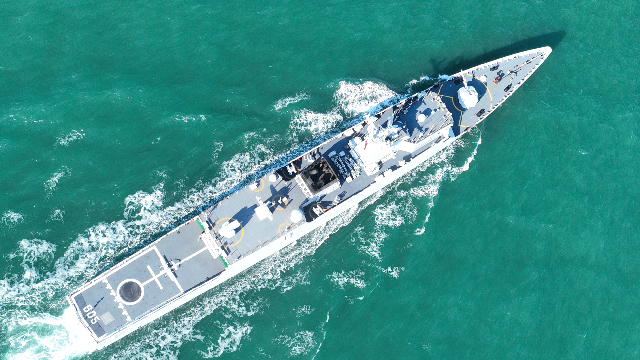
On November 9, local time, smoke rises on a building in Gaza City after suffering the Israeli air strike (Photo from Xinhua)
The new round of Palestinian-Israeli conflict has been ongoing since the outburst in early October, and the death toll on both sides has exceeded 10,000. Amid the escalation of the conflict, the US simply tentatively supported a temporary ceasefire when expressing its position toward Israel, and even sent the Secretary of State Antony Blinken to visit the Middle East for talks with Israel and multiple Arab countries. Recently, US President Joe Biden also spoke with Israeli Prime Minister Benjamin Netanyahu about the possibility of implementing a tactical ceasefire.
Jin Yinan, a military commentator and a professor with the National Defense University (NDU) of the Chinese PLA, commented that this round of Palestinian-Israeli conflict is a clearance operation of Israel on the Gaza Strip. From a military point of view, although advancing slowly in the ground offensive actions, the Israeli military has gradually gained the upper hand in the conflict, yet will cost heavily from sustained operations.
As the death toll continues to rise, the voices urging Israel and Palestine to cease fire are increasingly strong within the international community. Meanwhile, many countries have announced to sever diplomatic relations with Israel or recall their ambassadors to express their discontent with the large number of civilian casualties caused by Israel's indiscriminate attacks in military operations. In such an overwhelming public opinion climate, there has been a subtle shift in the attitude of the US.
Jin pointed out that the US had been acting as the largest supporter of Israel across the world, but now this hardcore ally is trying to keep some distance from Israel, in order to avoid significant negative impacts on itsown international reputation and image as a result of endorsing whatever behaviors of Israel.
At the moment, the anti-war sentiments are surging across the globe. The UN has adopted resolutions calling on the conflicting Israeli and Palestinian parties to immediately implement a persistent and sustainable humanitarian truce to cease hostile actions. Anti-Americanism is also on the rise across the Islamic and Arab worlds. The actions of Israel have provoked a huge backlash in the US and the West, and Europe become hazy in itsattitude but still staying apart from Israel.
In this case, to avoid greater losses, the US has to mitigate the bloodshed actions and propose a temporary ceasefire solution to Israel, that is, suspending the attacks on Gaza and establishing the so-called humanitarian corridor to allow relief goods to be supplied and the wounded to be carried out.
However, such a temporary ceasefire is essentially only a minor adjustment made by the US for the sake of its own interests and international reputation, but will not lead to substantial impacts on Israel's offensive operations.
Professor Jin Yinan indicated that such a behavior of the US is making a strategic retreat to gain ground. As a global power, the US is well aware of the significant consequences that Israel's persistent attacks will entail.
First, they will have a major impact on the international energy prices. The soaring energy prices pose serious drawbacks for the US economic recovery. In the wake of the Russia-Ukraine conflict, the US and the West had cut off energy ties with Russia, resulting in a sharp rise in oil and natural gas prices. Later, the US put pressure on Saudi Arabia hoping the latter increase oil production to stabilize the prices, but ultimately failed to achieve the goal. If this round of Israeli-Palestinian conflict spills over to aggravate the existing energy supply problems in the Middle East, the Western and American economies would face a catastrophic blow.
Second, Israel's military operations in the Gaza Strip are resulting in heightened anti-American emotions in the Middle East. Meanwhile, some terrorist organizations are likely to use the Palestinian-Israeli conflict as a chance to expand new members and their global influences. If allowed to unfold without intervention, it could potentially lead to major crises. The US fully understands the potential complications involved should the Middle East evolve into a real powder keg.
Third, the US' single-minded support for Israel will also trigger a strong reaction from its allies. Turkey had publicly questioned the motives behind the US deployment of aircraft carriers to the Mediterranean and even openly urged the US to withdraw their troops from the region. Under such circumstances, the US has to make some adjustments for now. That is because reckless support for Israel regardless of its military progress in the Gaza Strip will cause substantial repercussions on the US diplomacy and international image including its alliance relationship.
Professor Jin Yinan pointed out that this round of the Palestinian-Israeli conflict has severely impacted the global economic recovery, which is proceeding with difficulty after COVID-19. As the Palestinian-Israeli conflict continues to heat up, the world has been and will remainin a prolonged period of economic sluggishness, and even if the conflict has ceased, the trailing impacts will continue for some time.
Editor's note: Originally published on military.cnr.cn, this article is translated from Chinese into English and edited by the China Military Online. The information and opinions in this article do not necessarily reflect the views of eng.chinamil.com.cn.









